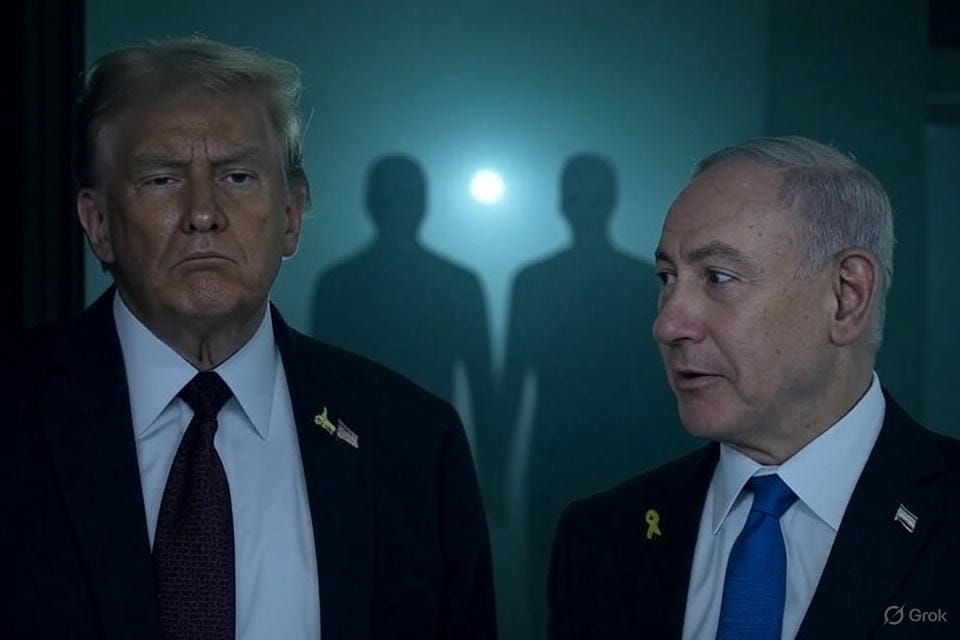
DESIGNED TO FAIL
Western leaders have been scrambling to find a way out of the declaration and enforcement of a two-state solution, despite the original agreement to do so at the UN on November 29, 1947.
Western leaders have been scrambling to find a way out of the declaration and enforcement of a two-state solution, despite the original agreement to do so at the UN on November 29, 1947. As the Israel-Gaza war rages on, the outrage and disgust for the way Israel conducts war has become overwhelming. Nearly worldwide, there are countless humans protesting what has now officially been recognized as a genocide, on an almost daily basis.
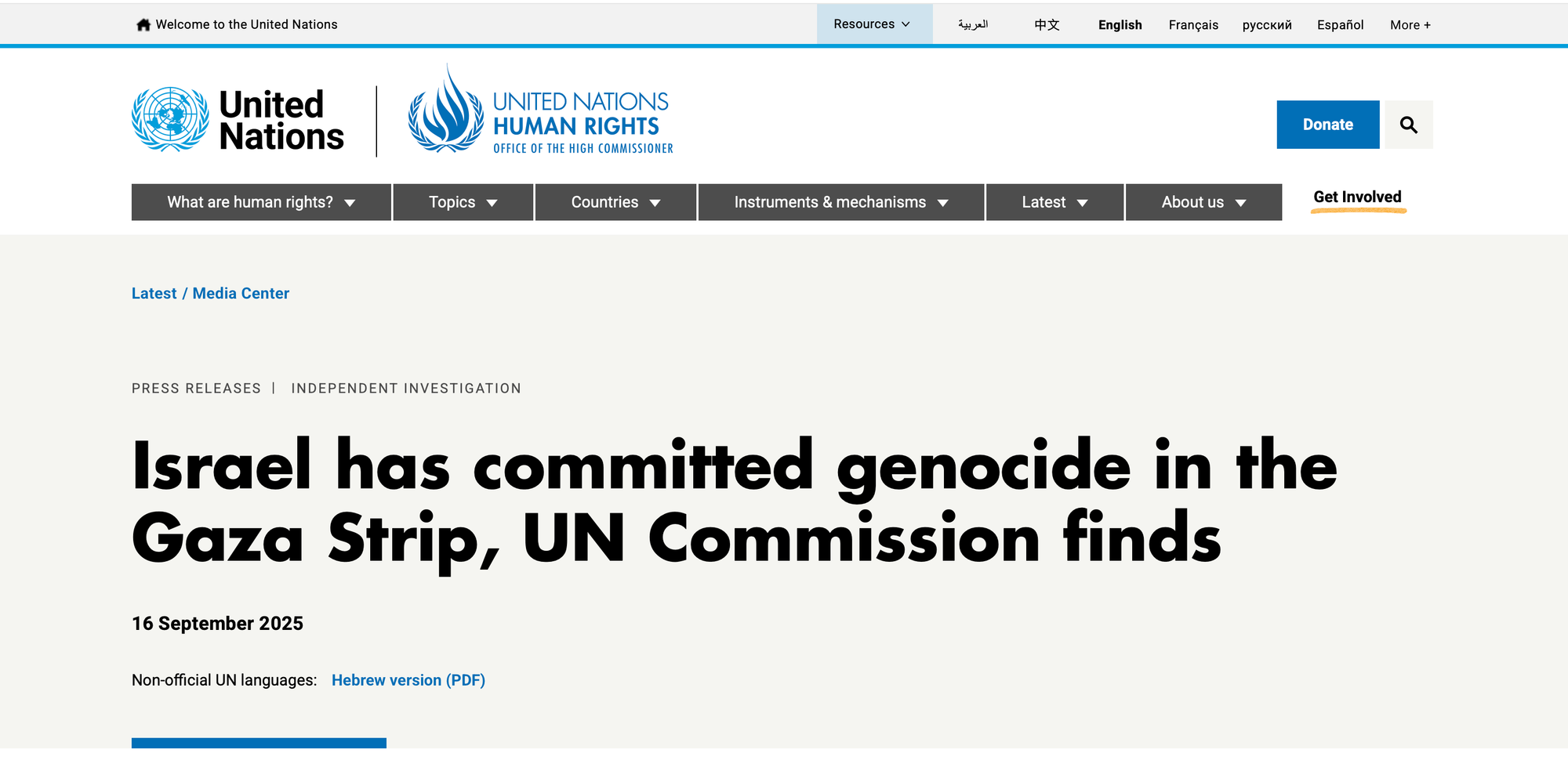
Countries like Yemen - where post prayer on Fridays, what appears to be the entire city takes to the streets to chant in solidarity with those suffering ethnic cleansing at the behest of the IDF. The people of Yemen are very serious about the situation and have shown it through remarkable force and disruption, which has no doubt stunned the Pentagon and thrown a serious wrench into its efforts of allowing Israel continue its war crimes.
Western leaders have faced growing backlash for their lack of action against the war. Most leaders avoid speaking about the war at all costs. When they do, there is generally a scripted talking point they spew, and it always starts with October 7th. The real issue, that Western leaders desperately want to avoid speaking about - is the proportionality of response. While October 7th was a crime in itself, the resulting actions of Israel have far surpassed proportional response, a point open for debate. However, despite that the Israelis have clearly crossed the threshold beyond disproportional into war crimes.
Some war crimes are less obvious than others, and the average person would not necessarily be able to spot a foreign military committing them, while observing social media, or the nightly news. Others are blatantly obvious. Israel has been committing blatantly obvious war crimes, since nearly the beginning of this war. Initially, those who saw and understood what was happening were primarily people with inherent connections to the region—Middle Easterners living in Western countries who had direct ties to the area and accessed news sources that Western media largely ignored. Western leaders only had to deal with the complaints of these small minorities, which appeared manageable. But as the war continued, the entire world became subject to non-stop video of what were very obviously war crimes. Even the common man, with no connection to the region, could see exactly what was happening. What was once contained to niche media circles has spread to the general public. The outrage is no longer limited to a manageable segment of the population—it has become mainstream, reaching critical mass and forcing politicians to respond.
The president of France, Emmanuel Macron, was the first to publicly declare that in the future, on behalf of France, he would announce a Palestinian state. For many this was sickening as it has always been thought that the recognition of a Palestinian state would automatically come with protections against Israeli attacks, thus the announcement to announce an announcement appeared to many that the genocide will continue until the declaration is made. As unlikely as that assumption might be, it was a step in the right direction. What Macron did was signal to the French who were anti-genocide, or pro-Palestine that he was working on the problem, for the remainder of the Western leaders it was a warning order. Macron told the whole world that a European leader would publicly announce a Palestinian state at the UN, and it was expected that others would follow. That means all other European and European friendly leaders better figure out how they were going to make that work.
Shortly after Macron’s announcement, Canada’s interim Prime Minister, Mark Carney, was confronted with questions about Canada’s position at a press event. His response was clumsy and unprepared - he even acknowledged that Macron’s announcement had come recently, making it clear he’d been caught off guard by the rapidly shifting diplomatic landscape. In late July, the Canadian government formalized its position: Canada would recognize a Palestinian state, but based on stipulations that were not achievable. Carney’s conditions required the Palestinian Authority to hold democratic elections in 2026, Hamas to immediately release the remaining Israeli hostages and disarm, and for any Palestinian state to be demilitarized. The Canadians issued this statement knowing full well these conditions were not achievable, but it bought them critical time to coordinate with the UK and Australia. Essentially this means that Canada “recognized a Palestinian state” appeasing half; but “only if these impossible conditions are met” appeasing the powerful.
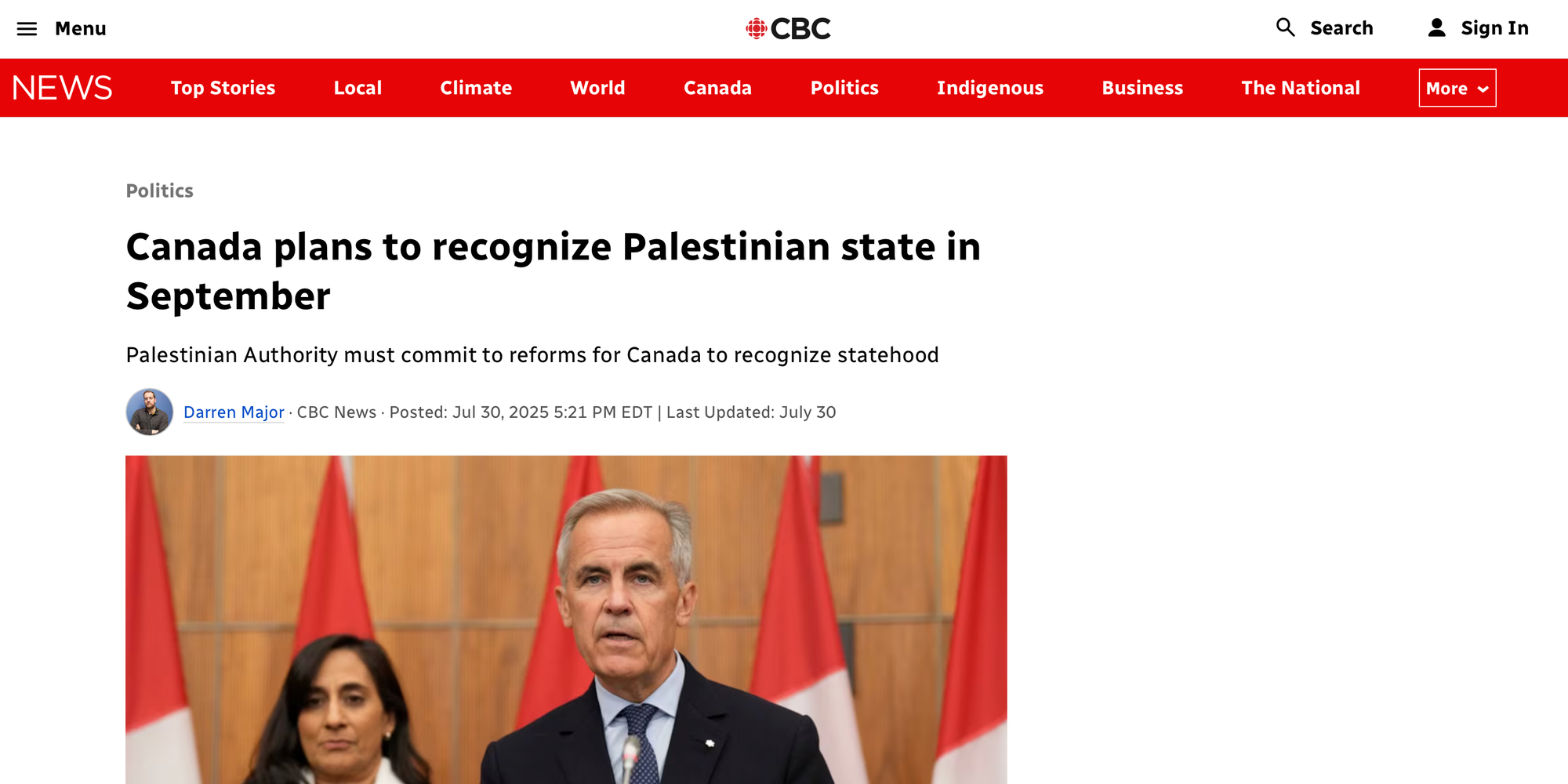
When the coordinated response came, the UK/Canada/Australia joint announcement on September 21, 2025 was an official declaration that Palestine now exists. The announcement contained very strong and reasonable language, without the earlier stipulations, although it still contained the mandatory October 7th declaration and reiterations about Hamas, in an attempt to soften the blow to those who disagree. Predictably it did not work, and many factions within their respective nations were outraged. It sparked a news battle between the government, Israeli supporters and pro-Palestinians. Much of it contained wild and ridiculous rhetoric. A common talking point used was that a recognition of a Palestinian state was a "reward for terrorism". From there the divided masses were free to argue and debate each other online. The entire thing has only served to divide the public.
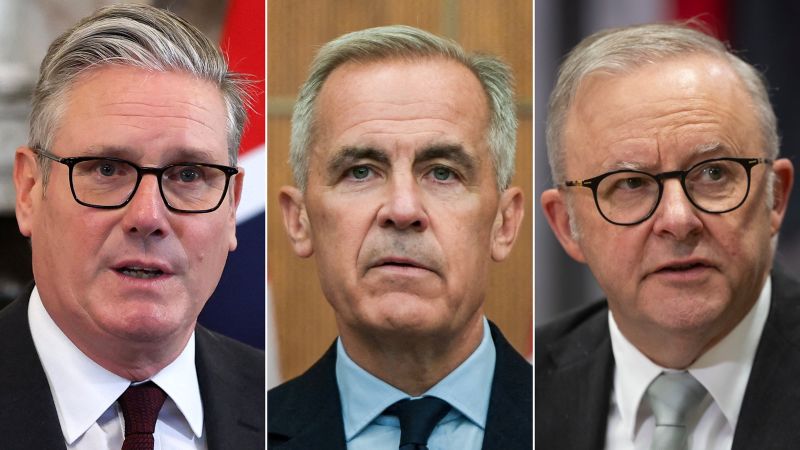
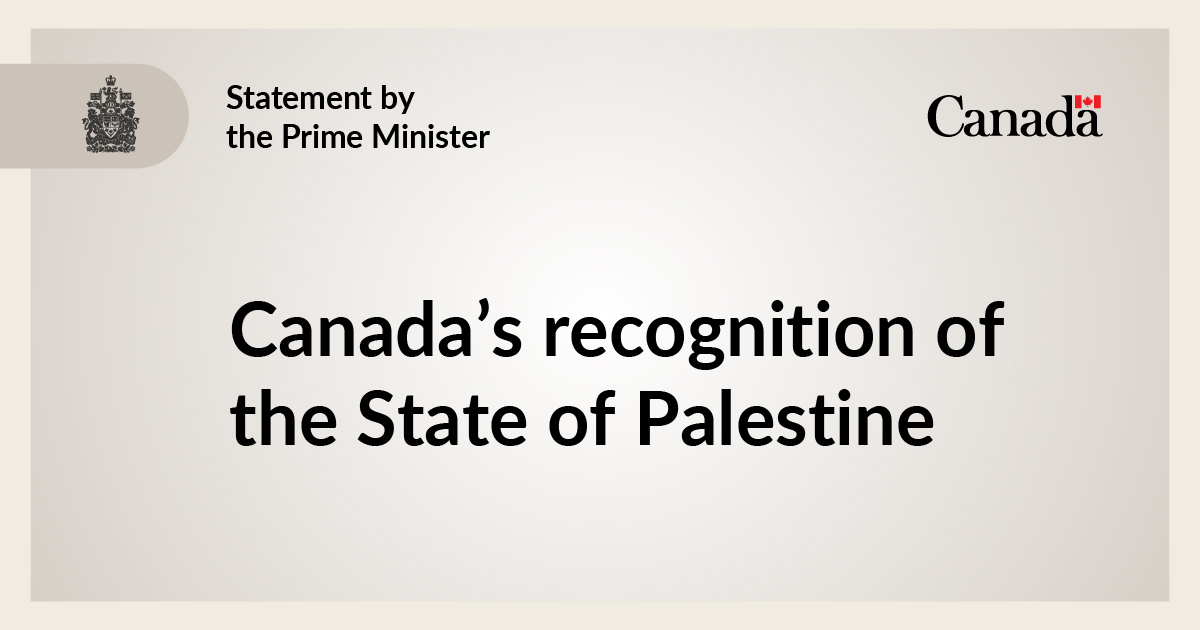
This strategic approach was deliberate. Canada rode the fence, somewhat satisfied some, made many angry, and maintained its earlier positions while officially recognizing Palestine. This buys everyone a little bit of time. Time that Israel needs to "finish the job". Macron said in his September 22, 2025 UN General Assembly speech that "The time has come because the urgency is everywhere. The time for peace has come because we are only moments away from no longer being able to seize it."
The leaders now have had the opportunity to take their position at the podium and announce a Palestinian state, many offered financial, humanitarian, logistical and even direct military support to ensure security of both the state of Israel and Palestine. Presumably we would see the ball starting to roll on these offerings. However, any progress depends on two individuals who control access to Gaza.
President Trump and Prime Minister Netanyahu both exert massive control over the entire area and neither of them see any of these offerings as a viable option at this time. President Trump publicly distanced the United States from shouldering the full cost of demolishing and rebuilding Gaza, stating that “The U.S. will take over the Gaza Strip, and we will do a job with it, too. We’ll own it and be responsible for dismantling all of the dangerous unexploded bombs and other weapons on the site. Level the site and get rid of the destroyed buildings.” However, he repeatedly emphasized that wealthy regional nations should finance the reconstruction.
Trump’s broader plan involved relocating all Palestinians from Gaza to other countries - a proposal that was met with international condemnation as forced displacement and ethnic cleansing contravene international law, both of which constitute war crimes and crimes against humanity under the Rome Statute of the International Criminal Court. This suggestion died quickly after the leaders of proposed host nations announced they would not accept forcefully relocated Palestinians. Just take a moment to think about how absurd this idea was: relocate an entire population so the U.S. and Israel could demolish and rebuild their homeland as they see fit, with the selling point being that Gaza had become “dangerous” and “uninhabitable” (Trump’s own February 2025 description).
Upon the conclusion of the UN General Assembly, Netanyahu met with Trump to discuss the path forward. Vigorous negotiations were held, and on September 29, 2025, President Trump and Prime Minister Netanyahu announced the ‘deal’ for Hamas. During the announcement, Trump spent an inordinate amount of time boasting about world leaders—carefully reading out their titles and countries—who had signed on, as if global support itself might cement the plan’s legitimacy.
The idea was to present an agreement that let these leaders return home having signaled their commitment to peace, with the political cover of participating in a “historic” initiative. On the surface, it looked like statesmanship. But the deal itself was clearly DOA (Dead on Arrival): its provisions were nearly impossible for Hamas to accept, and Trump explicitly stated that if Hamas refused or failed in any way, “Israel will finish the job” with full U.S. backing.
Complicating matters further, it was reported that Netanyahu made last-minute changes to the deal on the day of the announcement—alterations that reportedly angered some Arab foreign teams who had thought they were signing onto a plan with a real chance of success. In the end, many world leaders found themselves attached to a deal whose prospects had been sabotaged in private, leaving them with little more than a paper shield for domestic audiences—as the actual outcome in the Middle East remained unchanged.
Leaders know this deal is designed to fail, because Trump explicitly stated that Israel would have full US support to "finish the job" if there are any missteps. Finishing the job is the primary aim of Israel's war against the Palestinians of Gaza, and the West Bank. These leaders know that the conditions for peace will not be met, even if they were met - Israel would most definitely sabotage efforts, which would allow them to finish the job, per the internationally agreed upon deal.
This statement sounds harsh, so it's worth noting that on September 9, 2025, Israel conducted an airstrike in Qatar targeting Hamas leaders during ceasefire talks, killing five Hamas members and one Qatari security officer. The strike, which Qatar condemned as "state terrorism," effectively ended the Qatar-US led effort to negotiate peace with Hamas.
The world's leaders have taken their public position: recognition of a Palestinian state. Behind this facade, they will sit idly by, waiting for the peace deal's inevitable collapse - and for Israel to finish the job.

